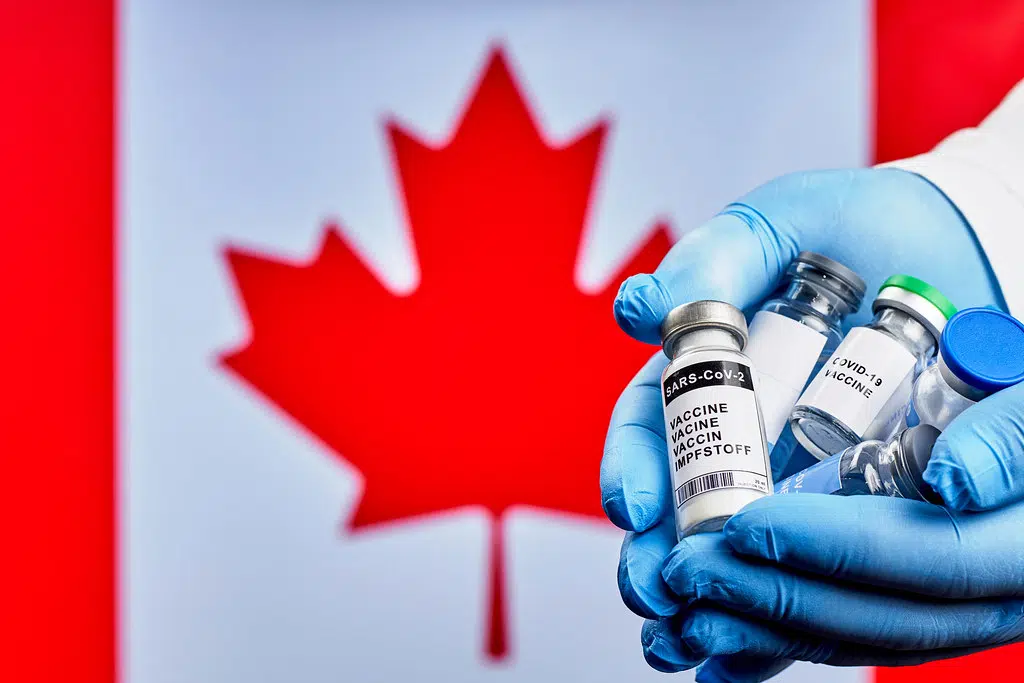Ontario is reporting 29-hundred and 61 new COVID-19 infections today (Jan 13) and 74 more deaths in advance of a stay-at-home order taking effect at 12:01 a.m. that coincides with a second State of Emergency implemented yesterday (Jan 12).
Residents must stay home as of tomorrow, except for trips to the grocery store, getting exercise and going to medical appointments.
Today, the province announced the expansion of COVID-19 Immunization Program: to Seniors, Frontline Essential Workers in next phase of the rollout plan (see more details below).
Northumberland County warden, Bob Crate, issued a statement last night (Jan 12) following Premier Doug Ford’s announcement yesterday.
Crate says the number one concern of the county will continue to be preserving health and wellbeing of residents and staff while continuing to provide the services people count on.
After a meeting of the local Emergency Control Group, a county-wide state of emergency is not being declared at this time, but you’ll find those complete details here: https://www.gonorthumberland.ca/2021/01/13/county-warden-bob-crate-issued-statement-following-premier-fords-major-announcement-yesterday/.
Locally, the HKPR District Health Unit is reporting 5 new cases in our region: 3 in Northumberland and 2 in Kawartha Lakes.
In Northumberland, there is now 30 unresolved cases in our county, with 277 resolved to date.
Since the start of the pandemic there have been 671 cases in the health unit’s region.
The health unit has listed 53 as high risk contacts in Northumberland, meaning 53 Northumberland County residents have recently been in close contact with someone who tested positive for COVID-19.
You can find out more about local numbers by visiting https://app.powerbi.com/view?r=eyJrIjoiOTJkYWRmODgtYzg5Ni00MmMyLWIzODgtNDU4ODYxZTVlNzc3IiwidCI6IjdkYzFmZjlkLTA1ZjEtNGNhNi1iYWZlLTIyNmZmNWYxNmJkYSJ9.
—
*MORE DETAILS ON PHASE 2 OF VACCINATION ROLLOUT:
News Release:
Ontario to Vaccinate up to 8.5 Million People in Phase Two
January 13, 2021
Province to Expand COVID-19 Immunization Program to Seniors, Frontline Essential Workers in Next Phase of Rollout Plan
TORONTO — The Ontario government is preparing to immunize up to 8.5 million people before the end of Phase Two of the government’s vaccine implementation plan, which aims to receive, store and administer COVID-19 vaccines to Ontarians as soon as supply is available.
Details were provided today by Premier Doug Ford, Christine Elliott, Deputy Premier and Minister of Health, Solicitor General Sylvia Jones, and General Rick Hillier (retired), Chair of the COVID-19 Vaccine Distribution Task Force.
“With Phase One of our plan well underway, we’re getting ready to expand our vaccine rollout and get more needles into arms as soon as the supply is available,” said Premier Ford. “We now have a well-oiled machine, led by General Hillier, and we are making tremendous progress. We know this second phase will be an even larger logistical undertaking than the first. That’s why we’re ramping up our capacity on the ground to ensure these vaccines are administered quickly, beginning with the people who need them most.”
As recommended by the COVID-19 Vaccine Distribution Task Force and aligned with the National Advisory Committee on Immunization, the province has mapped out the next steps for transitioning into Phase Two and has adopted an approach for identifying the next groups to receive the vaccination as early as March 2021. In order to vaccinate Ontarians as safely and quickly as possible, the government is expanding the list of health care providers who can administer COVID-19 vaccines.
Phase One of the vaccine implementation program is expected to see approximately 1.5 million eligible people vaccinated. Vaccination of residents, staff and essential caregivers of long-term care homes has begun in many parts of the province, with the goal of having the first dose administered in all homes no later than February 15, 2021. The vaccination of all staff and residents in long-term care homes in four areas with the highest rates of transmission, Toronto, Peel, York and Windsor Essex, is expected to be completed by January 21, 2021.
Groups eligible to receive vaccines as part of Phase Two of the Ontario immunization program will include:
Older adults, beginning with those 80 years of age and older and decreasing in five-year increments over the course of the vaccine rollout;
Individuals living and working in high-risk congregate settings;
Frontline essential workers (e.g., first responders, teachers, food processing industry); and
Individuals with high-risk chronic conditions and their caregivers.
Phase Two is expected to be completed by end of July 2021 and Phase Three for the general population could begin as early as August 2021, pending availability of vaccines. Vaccination of populations in Phase One will continue until all vaccinations are complete.
“We are prepared for the next phase in our vaccine distribution plan, but with limited supplies, our focus will be on vaccinating our seniors and frontline essential workers,” said Christine Elliott, Deputy Premier and Minister of Health. “When Ontario receives sufficient doses of vaccines, we will ensure that every person who wants to be vaccinated will receive it. Until then, everyone must continue to follow the public health guidelines and stay home, stay safe and save lives.”
In preparation for Phase Two of the vaccination distribution plan, more vaccination sites will be added. Over the coming months, those sites will include municipally run vaccination sites, hospital sites, mobile vaccination sites, pharmacies, clinics, primary care settings and community locations such as community health centres and aboriginal health access centres. The first municipally run vaccination site will be opening on January 18 at the Metro Toronto Convention Centre. The site will be administering vaccines to Phase One priority populations, including select frontline health care workers. It will be an initial proof-of-concept for municipally run vaccination centres, with a small number of doses to start with, from which learnings will be used to inform other locations across the province.
“Ontario’s immunization program is a monumental mission, and we have laid the foundations to ensure it remains successful as more vaccines become available and as we scale our rollout to reach more people across our province,” said Solicitor General Sylvia Jones. “By expanding the immunization program to more seniors and a broader list of frontline essential workers we are ensuring Ontario is ready to protect those who need it most as we receive the vaccines.”
“As you can see, we are consumed with delivering and administering our vaccines as quickly, efficiently and equitably as possible. This is great news for the people of Ontario,” said General (Ret’d) Rick Hillier. “Despite the difficult times we find ourselves in, this proves that there is light at the end of the tunnel and, with that in mind, I’m asking everyone to stay strong, stay safe and follow the public health guidelines.”
As the vaccine supply increases, and guided by the Ethical Framework for COVID-19 vaccine distribution, Ontario is also enabling more health care providers to administer the vaccine as quickly and safely as possible. This will help meet the unprecedented demand in the number of people who will be getting vaccinated. It will also increase access to the vaccine for all Ontarians, whether they reside in a remote fly-in community or a large urban centre. Health care professionals who are able to administer the vaccine can register and apply through Ontario’s Matching Portal. This could include nurse practitioners, registered nurses and registered practical nurses, along with pharmacists, pharmacy students, interns and pharmacy technicians.
Individuals interested in supporting the broader COVID-19 vaccination plan in roles such as data entry and scheduling, can also express their interest through Ontario’s Matching Portal.
As the vaccination rollout continues, it remains critically important that all Ontarians continue following public health advice to protect our communities and most vulnerable populations, and to stop the spread of COVID-19.

